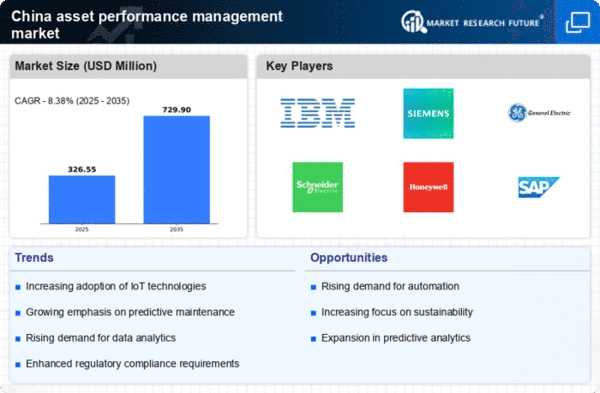Growing Focus on Sustainability
Sustainability is emerging as a critical driver for the asset performance-management market in China. As environmental concerns gain prominence, organizations are increasingly prioritizing sustainable practices in their operations. This shift is prompting companies to adopt asset performance-management solutions that not only enhance efficiency but also minimize environmental impact. The Chinese government has set ambitious goals for carbon neutrality by 2060, which is likely to encourage investments in sustainable asset management practices. Companies that integrate sustainability into their asset management strategies may experience enhanced brand reputation and customer loyalty, further driving the growth of the asset performance-management market.
Government Initiatives and Regulations
In China, government initiatives aimed at enhancing industrial productivity and sustainability are significantly influencing the asset performance-management market. Policies promoting smart manufacturing and digital transformation are encouraging enterprises to adopt advanced asset management practices. The government has set ambitious targets for reducing energy consumption and emissions, which necessitates the implementation of effective asset performance-management strategies. For instance, the Ministry of Industry and Information Technology has outlined plans to increase the adoption of intelligent manufacturing technologies by 30% by 2025. Such regulatory frameworks are likely to drive investments in asset performance-management solutions, as companies align their operations with national objectives, thereby stimulating market growth.
Rising Demand for Operational Efficiency
The asset performance-management market in China is experiencing a notable surge in demand for operational efficiency. Industries are increasingly recognizing the need to optimize asset utilization and reduce downtime. This trend is driven by the competitive landscape, where companies strive to enhance productivity and minimize costs. According to recent data, organizations that implement effective asset performance-management strategies can achieve up to 20% improvement in operational efficiency. This growing emphasis on efficiency is likely to propel investments in advanced asset management solutions, thereby fostering market growth. As companies seek to leverage technology for better asset oversight, the asset performance-management market is poised to expand significantly in response to these operational demands.
Increased Investment in Smart Manufacturing
The asset performance-management market in China is benefiting from a substantial increase in investment in smart manufacturing technologies. As industries transition towards automation and digitalization, the demand for sophisticated asset management solutions is on the rise. Investments in smart factories are projected to reach $300 billion by 2025, reflecting a growing commitment to enhancing operational capabilities. This trend is likely to drive the adoption of asset performance-management systems that facilitate real-time monitoring and predictive maintenance. As companies seek to optimize their manufacturing processes, the asset performance-management market is expected to expand, fueled by the integration of smart technologies.
Technological Advancements in Data Analytics
The asset performance-management market in China is being significantly shaped by rapid advancements in data analytics technologies. The ability to collect, analyze, and interpret vast amounts of data is becoming increasingly crucial for organizations aiming to enhance asset performance. Technologies such as machine learning and artificial intelligence are enabling predictive maintenance and real-time monitoring, which can lead to substantial cost savings. Reports indicate that companies utilizing advanced analytics can reduce maintenance costs by up to 15%. As these technologies become more accessible, the asset performance-management market is likely to witness a surge in adoption, as businesses seek to leverage data-driven insights for improved decision-making.
















